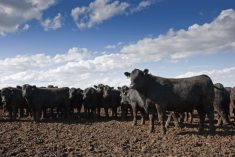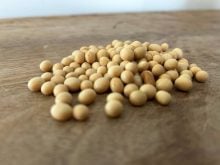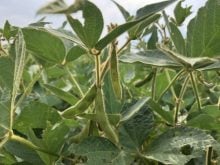For the week ending July 12, Western Canadian yearling markets traded steady to $5 higher compared to seven days earlier. Calves weighing 550-800 pounds were quoted $5 lower to as much as $10 higher. Steer calves under 550 pounds traded $15 to as much as $40 higher than prices from the week earlier. Heifers under 550 pounds were steady to $10 higher.
The U.S. closed the border to Mexican cattle on May 11 in an effort to combat New World Screwworm (NWS). A reopening process started on July 7 under a phased reopening of select southern border ports. On July 10, the U.S. cancelled the potential opening after a new case was reported in Veracruz.
Read Also

U.S. grains: CBOT soybeans, corn, wheat fall in USDA data aftermath
Chicago grains took a dive on Friday, following a closely watched U.S. government crop report and the release of export data that could provide clues into Chinese buying.
The screwworm infestation is now one Mexican state away from crossing into Texas. Feedlot operators in Alberta are watching this closely. If New World screwworm moves into the U.S., the Canadian border may close to U.S. feeder cattle. In 2024, Canada imported 400,060 cattle from the U.S. Most of these imports were Holstein cross feeder cattle.
Late in the week, certain buyers were extremely aggressive on light-weight steer calves as the fear started to percolate.
In Southern Manitoba, yearling mixed steers on backgrounding ration in the feedlot with full preconditioning averaging 1,040 pounds traded for $390. Similar quality backgrounded heifers averaging 1,000 pounds were quoted at $373. Northwest of Saskatoon, black yearling steers off grass with a mean weight of 1,050 pounds were valued at $400 for late September delivery. At the Ponoka sale on July 9, a smaller package of tan steers weighing 1,000 pounds off grass and mineral with full health data traded for $399.
In Central Alberta, smaller packages of 700-715 pound mixed steers were trading in the range of $498-$505/cwt. These cattle appeared to be off grass and fully weaned or semi-weaned.
In late June, Perlich Bros Auction Market near Lethbridge had larger packages of calves for November and December delivery. Higher quality 640-pound steer calves not fully weaned were trading for $540/cwt and 500-pound steer calves were trading for $605/cwt.
This week, there appear to be extreme demand for 500-pound steers calves. The DLMS had 530-pound steer calves trading from $688-$699. There was a steer package at 515 pounds that traded for $670. Off-grid private sales included higher quality genetic steer calves with a base weights from 500-525 pounds trading from $650-$660.
On Thursday, July 10, Alberta packers were buying fed cattle on a dressed basis in the range of $495-$500/cwt delivered, steady to $1 lower than active trade on July 3. Live trade fob feedlot in Southern Alberta was quoted at $294-$295/cwt, unchanged from last week.
On Friday, July 11, U.S. packers were buying fed cattle in Texas and Kansas in the range of $228-$230/cwt, $4-$6/cwt higher than seven days earlier. U.S. packers are expected to be extremely aggressive on Canadian fed cattle over the next month given the U.S. premium market premium.















